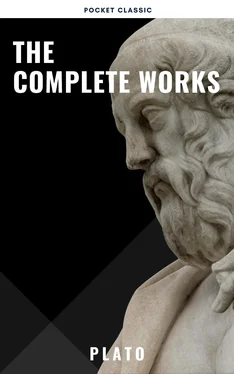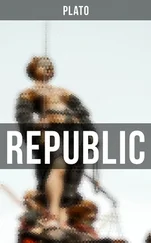POLUS: Certainly.
SOCRATES: And is not this universally true? If a man does something for the sake of something else, he wills not that which he does, but that for the sake of which he does it.
POLUS: Yes.
SOCRATES: And are not all things either good or evil, or intermediate and indifferent?
POLUS: To be sure, Socrates.
SOCRATES: Wisdom and health and wealth and the like you would call goods, and their opposites evils?
POLUS: I should.
SOCRATES: And the things which are neither good nor evil, and which partake sometimes of the nature of good and at other times of evil, or of neither, are such as sitting, walking, running, sailing; or, again, wood, stones, and the like:—these are the things which you call neither good nor evil?
POLUS: Exactly so.
SOCRATES: Are these indifferent things done for the sake of the good, or the good for the sake of the indifferent?
POLUS: Clearly, the indifferent for the sake of the good.
SOCRATES: When we walk we walk for the sake of the good, and under the idea that it is better to walk, and when we stand we stand equally for the sake of the good?
POLUS: Yes.
SOCRATES: And when we kill a man we kill him or exile him or despoil him of his goods, because, as we think, it will conduce to our good?
POLUS: Certainly.
SOCRATES: Men who do any of these things do them for the sake of the good?
POLUS: Yes.
SOCRATES: And did we not admit that in doing something for the sake of something else, we do not will those things which we do, but that other thing for the sake of which we do them?
POLUS: Most true.
SOCRATES: Then we do not will simply to kill a man or to exile him or to despoil him of his goods, but we will to do that which conduces to our good, and if the act is not conducive to our good we do not will it; for we will, as you say, that which is our good, but that which is neither good nor evil, or simply evil, we do not will. Why are you silent, Polus? Am I not right?
POLUS: You are right.
SOCRATES: Hence we may infer, that if any one, whether he be a tyrant or a rhetorician, kills another or exiles another or deprives him of his property, under the idea that the act is for his own interests when really not for his own interests, he may be said to do what seems best to him?
POLUS: Yes.
SOCRATES: But does he do what he wills if he does what is evil? Why do you not answer?
POLUS: Well, I suppose not.
SOCRATES: Then if great power is a good as you allow, will such a one have great power in a state?
POLUS: He will not.
SOCRATES: Then I was right in saying that a man may do what seems good to him in a state, and not have great power, and not do what he wills?
POLUS: As though you, Socrates, would not like to have the power of doing what seemed good to you in the state, rather than not; you would not be jealous when you saw any one killing or despoiling or imprisoning whom he pleased, Oh, no!
SOCRATES: Justly or unjustly, do you mean?
POLUS: In either case is he not equally to be envied?
SOCRATES: Forbear, Polus!
POLUS: Why ‘forbear’?
SOCRATES: Because you ought not to envy wretches who are not to be envied, but only to pity them.
POLUS: And are those of whom I spoke wretches?
SOCRATES: Yes, certainly they are.
POLUS: And so you think that he who slays any one whom he pleases, and justly slays him, is pitiable and wretched?
SOCRATES: No, I do not say that of him: but neither do I think that he is to be envied.
POLUS: Were you not saying just now that he is wretched?
SOCRATES: Yes, my friend, if he killed another unjustly, in which case he is also to be pitied; and he is not to be envied if he killed him justly.
POLUS: At any rate you will allow that he who is unjustly put to death is wretched, and to be pitied?
SOCRATES: Not so much, Polus, as he who kills him, and not so much as he who is justly killed.
POLUS: How can that be, Socrates?
SOCRATES: That may very well be, inasmuch as doing injustice is the greatest of evils.
POLUS: But is it the greatest? Is not suffering injustice a greater evil?
SOCRATES: Certainly not.
POLUS: Then would you rather suffer than do injustice?
SOCRATES: I should not like either, but if I must choose between them, I would rather suffer than do.
POLUS: Then you would not wish to be a tyrant?
SOCRATES: Not if you mean by tyranny what I mean.
POLUS: I mean, as I said before, the power of doing whatever seems good to you in a state, killing, banishing, doing in all things as you like.
SOCRATES: Well then, illustrious friend, when I have said my say, do you reply to me. Suppose that I go into a crowded Agora, and take a dagger under my arm. Polus, I say to you, I have just acquired rare power, and become a tyrant; for if I think that any of these men whom you see ought to be put to death, the man whom I have a mind to kill is as good as dead; and if I am disposed to break his head or tear his garment, he will have his head broken or his garment torn in an instant. Such is my great power in this city. And if you do not believe me, and I show you the dagger, you would probably reply: Socrates, in that sort of way any one may have great power—he may burn any house which he pleases, and the docks and triremes of the Athenians, and all their other vessels, whether public or private— but can you believe that this mere doing as you think best is great power?
POLUS: Certainly not such doing as this.
SOCRATES: But can you tell me why you disapprove of such a power?
POLUS: I can.
SOCRATES: Why then?
POLUS: Why, because he who did as you say would be certain to be punished.
SOCRATES: And punishment is an evil?
POLUS: Certainly.
SOCRATES: And you would admit once more, my good sir, that great power is a benefit to a man if his actions turn out to his advantage, and that this is the meaning of great power; and if not, then his power is an evil and is no power. But let us look at the matter in another way:—do we not acknowledge that the things of which we were speaking, the infliction of death, and exile, and the deprivation of property are sometimes a good and sometimes not a good?
POLUS: Certainly.
SOCRATES: About that you and I may be supposed to agree?
POLUS: Yes.
SOCRATES: Tell me, then, when do you say that they are good and when that they are evil—what principle do you lay down?
POLUS: I would rather, Socrates, that you should answer as well as ask that question.
SOCRATES: Well, Polus, since you would rather have the answer from me, I say that they are good when they are just, and evil when they are unjust.
POLUS: You are hard of refutation, Socrates, but might not a child refute that statement?
SOCRATES: Then I shall be very grateful to the child, and equally grateful to you if you will refute me and deliver me from my foolishness. And I hope that refute me you will, and not weary of doing good to a friend.
POLUS: Yes, Socrates, and I need not go far or appeal to antiquity; events which happened only a few days ago are enough to refute you, and to prove that many men who do wrong are happy.
SOCRATES: What events?
POLUS: You see, I presume, that Archelaus the son of Perdiccas is now the ruler of Macedonia?
SOCRATES: At any rate I hear that he is.
POLUS: And do you think that he is happy or miserable?
SOCRATES: I cannot say, Polus, for I have never had any acquaintance with him.
POLUS: And cannot you tell at once, and without having an acquaintance with him, whether a man is happy?
SOCRATES: Most certainly not.
POLUS: Then clearly, Socrates, you would say that you did not even know whether the great king was a happy man?
SOCRATES: And I should speak the truth; for I do not know how he stands in the matter of education and justice.
Читать дальше












